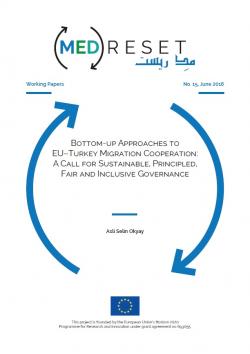Bottom-up Approaches to EU–Turkey Migration Cooperation: A Call for Sustainable, Principled, Fair and Inclusive Governance
Based on stakeholder consultations in Turkey, this report examines civil society actors’ views on policy issues regarding migration and mobility, the factors underlying these issues, and the actors’ assessment of policies and cooperation mechanisms developed by the EU and Turkey. The consultations show that the inclusion of Syrian refugees and broader social cohesion are by far the top priorities. Rights of refugees and (irregular) migrants, and Turkish citizens’ facilitated mobility in the EU also form part of the civil society’s policy priority repertoire. As for EU policies and EU–Turkey cooperation, a substantial rethink is needed on three major points. The first is the need to go beyond policies oriented at preventing and deterring human mobility that would fail the tests of effectiveness and sustainability in the longer term, and to focus on broadening and diversifying options for authorized migration and mobility. Second, a reprioritization of respect for human rights and international law is needed, as the currently predominant restrictive and instrumentalizing approaches have negative implications not only for migrants, but also for the development of a rights-sensitive migration governance regime, the capacity of civil society to defend pro-rights positions, and broader social cohesion in Turkey. Third, the EU needs to rethink and invest in fairer responsibility-sharing mechanisms that are not limited to times of “crisis”. Such mechanisms should include financial support, (actually enforced) resettlement, and holistic measures aimed at enhancing the protection capacity of third countries like Turkey with its state and non-state stakeholders. Maximizing the positive impact of EU–Turkey cooperation on refugee integration, enhanced protection capacity, and overall social cohesion requires bottom-up approaches to defining funding priorities and designing locally tailored measures. This implies that the EU needs to closely engage with a broader range of local governmental and non-governmental actors, while being sensitive to the specificities of domestic political-institutional culture.
-
Details
Rome, IAI, June 2018, 24 p. -
In:
-
Issue
Working Paper 15
Introduction
1. Methodology and Fieldwork in Turkey
2. A Qualitative Analysis of Stakeholders’ Frames in the Area of Migration and Mobility
2.1 Framing Migration within a Broader Policy Context
2.2 Migration-Related Priority Policy Issues and Their Underlying Factors
2.2.1 General Migration-Related Issues and Their Drivers
2.2.2 Policy Issues and Priorities within the Context of Turkey
The “non-issues”: Emigration and gender-specific issues
Policy priorities and their drivers
3. Evaluating EU Policies and EU–Turkey Migration Cooperation
4. Policy Implications and Bottom-up Insights for EU–Turkey Cooperation on Migration and Mobility
References
Annex: List of Interviews



